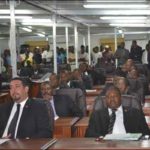 Port-au-Prince, Haiti – “It was a constitutional coup d’état,” revolted some think tanks, “a parliamentary drive by,” they cried. Others characterized the actions of Haiti’s national assembly as “nothing short of a theatrical performance.” Still, many political observers declared the constitutional amendments “unconstitutional” and called for an annulment of the adopted articles by presidential decree.
Port-au-Prince, Haiti – “It was a constitutional coup d’état,” revolted some think tanks, “a parliamentary drive by,” they cried. Others characterized the actions of Haiti’s national assembly as “nothing short of a theatrical performance.” Still, many political observers declared the constitutional amendments “unconstitutional” and called for an annulment of the adopted articles by presidential decree.
The timing and unprecedented speed with which the assembly delivered the amendments rattled many in Haitian civil societies, political and diplomatic circles. Many in the national press, namely Marvel Dandin, a revered journalist and people advocate of Radio Kiskeya, branded those developments the “sweep it under the rug” practices. It took 20 hours in two sessions for the 49th legislative body to pass more than one hundred amendments to the constitution for the first time since its 1987 inception.
Georges Michel, Scholar and co-author of the original document, declared the maneuver unconstitutional and accused the international players currently in Haiti of interfering in the country’s domestic affairs. “These foreigners need to go elsewhere,” he declared during an interview on Panel Magik, a radio show aired on station Magik 100.9. “We are the rulers of our country,” he added. Michel later insisted, “They are in blatant violation of a UN provision that forbid this practice,” directing his comments at UN Secretary-General Ban Ki-moon and UN Ambassador Edmond Mulet who articulated the need to amend the Haitian Constitution.
Most controversial, among many, was the replacement of article 134.3, long considered a safeguard against possible power grabs by limiting presidential terms to two, but never consecutively. Instead, legislators introduced article 134.1 that stipulated, “The presidential term will be five years. He will automatically be re-electable, but cannot—under any circumstances—serve a third term.”
Senator Steven Benoit, Alternative Party candidate from the West, erupted over the new additions to the proposed amendments and walked out in protest after making a passionate plea to his colleagues. “If the Assembly wants to grant Haitian presidents consecutive terms, it’s fine,” Benoit stated. “However, for the record” he continued, “The declaration of amendments signed by the commission of which I am a member, made no mention of consecutive terms for presidents,” he added. That is, article 134.1 was never part of the proposed amendments promulgated by the 48th legislature on September 14, 2009, yet was introduced with the others. “I am objecting to these practices on principle, not to attack anyone,” Benoit later explained.
News reports indicated that the Bicameral Commission headed by Francois Anick Joseph, first senator from the Artibonite Department, introduced the impromptu legislation at 11:53 p.m. on May 9, 2011, some seven minutes before the session expired. The legislative fiscal year ending at midnight on May 9 would require legislators to reconsider those amendments no later than 2016, during the last session of the 49th legislature. Hence, the late introduction of 134.1 was a deliberate attempt to ram it through without any debate knowing its controversial nature. In addition to consecutive presidential terms, Haitian legislators also made other significant changes, including:
After making his emotional remarks vehemently rejecting the surprised additions, Benoit left the session leaving legislators in a gridlock and bitter disagreements. He denounced the deplorable acts as “a power-sharing deal between incumbent President Rene Preval and elected president Michel Martelly,” both of who had representatives on the floor monitoring the developments.
Due to time constraints and growing opposition to article 134.1, the Bicameral Commission removed it from the bill making it possible for a vote to take place before time expired. Finally, with 80 votes for, eight against and seven absents the amendments made it through in record time.
Legislators reasoned that elections were too costly; hence attempted to alleviate the country of this burden by extending their terms. Many political analysts, concerned over the dangerous precedent set by the lawmakers, found it ironic those Haitian lawmakers branded elections, great guarantor of democracy, as a nuisance to the democratic process the electorate hired them to protect. However, the most sobering critic might have been articulated through the pages of Haiti Progres, a renowned Haitian newspaper that posed the following question in its editorial: “Is it not ironic that the population voted for the 1987 Constitution through a referendum, which– at the same time– prevents it from amending the constitution by referendum?” Haiti Progres was referring to article 284-3 on the original document declaring, “any prevalent constitutional amendments by referendum strictly prohibited.”
Meanwhile, Michel embarked on a one-man crusade attempting to reverse the process by judicial means if necessary. “The is only one thing to do,” he contended, “Stop these flawed amendment processes and start over in the 49th legislature to ensure a healthier discourse through formal debates,” he articulated. “Not a 45-minute amendment process,” Michel further remarked. However, some observers demanded more rigorous disciplinary measures against legislators. “Identify and sanction all perpetrators of this failed parliamentary coup d’état on May 9, 2011,” proposed Dandin in an article. “Democracy and justice don’t walk hand-in-hand with impunity,” he wrote.